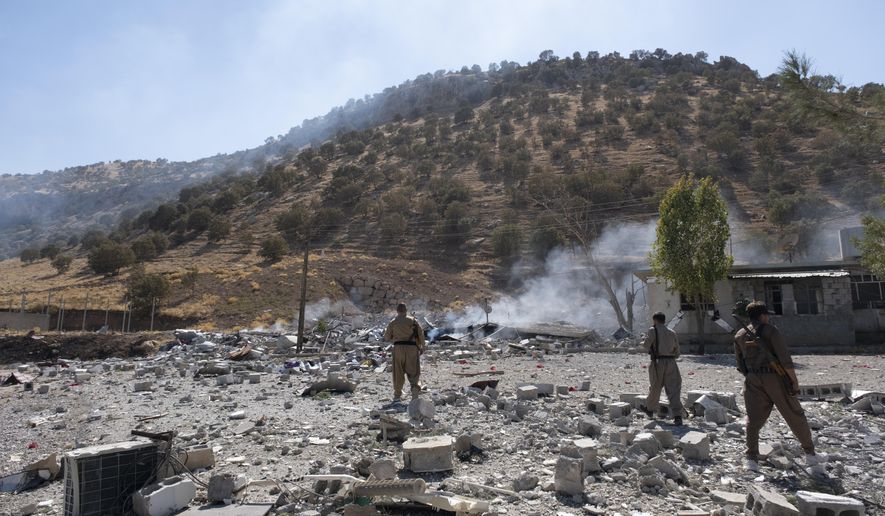Iran launched dozens of missile and drone strikes at Kurdish positions in northern Iraq that are believed to have killed or wounded almost 40 people. Wednesday’s attack, the fifth in as many days, resulted in a sharp rebuke from U.S. officials who called it an “unjustified violation of Iraqi sovereignty and territorial integrity.”
Tehran accused Kurdish opposition groups targeted in the attack of fomenting unrest in Iran following the death in police custody of Mahsa Amini, a 22-year-old Iranian Kurd who was detained over claims that she violated the country’s strict headscarf law. The missile and drone strikes were carried out by Iran’s powerful Islamic Revolutionary Guard Corps.
“We are also aware of reports of civilian casualties and deplore any loss of life caused by today’s attack,” State Department spokesman Ned Price said Wednesday. “We further condemn comments from the government of Iran threatening additional attacks against Iraq. We stand with the people and government of Iraq in the face of these brazen attacks on their sovereignty.”
Tehran said the attacks took place following repeated warnings to the officials of Iraqi Kurdistan over their failure to prevent cross-border incursions by the opposition groups.
“The IRGC ground force will continue with the attacks on the terrorist strongholds to ensure the security of the borders, punish the terrorists, and force the officials of the Iraqi Kurdistan region to carry out their duties in accordance with international regulations,” Iranian officials said, according to the state-owned Islamic Republic News Agency.
Kurdistan’s health ministry said nine people were killed while 32 others were injured in the Iranian shelling. Hospitals were told to prepare to receive the wounded from the Iranian bombing campaign.
The Kurdish Democratic Party of Iran, one of the opposition groups targeted by the IRGC, said the missile and drone attacks were intended to divert attention from the ongoing protests that have rocked Iran for almost two weeks. The regime has acknowledged some 41 people have died in the protests, but private rights groups say the number is far higher.
“The terrorist Islamic Revolutionary Guard Corps are right now attacking the headquarters of our party and adjacent refugee camps in Koya. We call on the international community not to remain silent,” the KDPI said on Twitter.
A senior IRGC general told Iran’s Tasnim News Agency that the targeted bases in Kurdistan played a major role in the recent riots there. Brig. Gen. Abbas Nilforooshan, the IRGC’s deputy commander for operations, said they were prepared to “destroy any base” acting against the security of Iran.
“Under no circumstances will we allow the formation of threats around the country,” Gen. Nilforooshan said.
The IRGC said the missile attacks were carried out with “pinpoint accuracy” and inflicted heavy losses on Kurdish personnel at the targeted bases.
“Such operations will continue decisively until the threat is removed effectively, the bases of terrorist groups are dismantled, and the [Kurdish Regional Government] officials honor their responsibility,” Iranian officials said, according to Tasnim.
British officials also lashed out at Iran, saying it should immediately cease the bombing campaign that has damaged civilian infrastructure along with causing the death of several protesters.
“These attacks are a violation of Iraq’s sovereignty and territorial integrity and are wholly unacceptable. They demonstrate a repeated pattern of Iranian destabilizing activity in the region,” Tariq Ahmad, British Minister of State for the Foreign Commonwealth and Development Affairs, said in a statement.
The demonstrations ignited by Ms. Amini’s death while in morality police custody have spread to dozens of cities in Iran, sparking a harsh government crackdown from security forces. Iran’s “morality police” arrested 22-year-old Mahsa Amini on Sept. 13, 2022, for allegedly not wearing a headscarf known as a hijab in full compliance with mandatory requirements. She collapsed at a detention center, falling into a coma where she died three days later from a heart attack, according to Iranian officials.
The United Nations said hundreds of people throughout Iran have been arrested in the demonstrations, including lawyers, human rights advocates, and at least 18 journalists. Security forces have responded to the demonstrations with live ammunition at times, U.N. officials said.
Ravina Shamdasani, a spokeswoman for the UN’s Acting High Commissioner for Human Rights, accused Tehran of failing to launch an adequate investigation into the circumstances surrounding Ms. Amini’s death and said they were concerned by Tehran’s disproportionate use of force against protesters.
“Firearms must never be used simply to disperse an assembly. In the context of assemblies, they should only be used in cases of an imminent threat to life or of serious injury,” Ms. Shamdasani said.
• Mike Glenn can be reached at mglenn@washingtontimes.com.




Please read our comment policy before commenting.